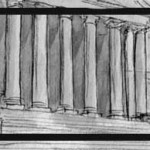The Supreme Court docket on Tuesday night time declined to block the execution, scheduled for Wednesday, of Lezmond Mitchell, the only Indigenous American on federal loss of life row. The justices, devoid of any famous dissents, denied two unexpected emergency requests from Mitchell searching for to postpone the execution. Mitchell had argued that he must be supplied the option to interview his jurors about prospective bias throughout deliberations and that the government’s prepared lethal-injection protocol violates federal legislation.
If the execution goes ahead, Mitchell will be the fourth federal inmate executed this calendar year just after nearly two many years in which the federal authorities did not carry out the loss of life penalty. A few further federal executions are scheduled just before the finish of September.
Mitchell, a Navajo male, was convicted and sentenced to loss of life in 2003 for the carjacking and stabbing fatalities of Alyce Trim and her 9-calendar year-previous granddaughter, who were also customers of the Navajo Nation. At Mitchell’s demo, prosecutors told jurors – all but 1 of whom were white – that, in the Previous West, Mitchell “would have been taken out back” and “strung up.”
Mitchell questioned to reopen his publish-conviction proceedings two many years in the past to interview the jurors about whether their deliberations were tainted by racial bias. He argued that he had that correct just after the Supreme Court’s 2017 conclusion in Peña-Rodriguez v. Colorado, which produced an exception when there is evidence of racial bias to the general policies prohibiting jurors from testifying about statements built throughout deliberations that might call a verdict into query. But a federal demo courtroom turned down his ask for, and the U.S. Court docket of Appeals for the ninth Circuit upheld that ruling.
Mitchell arrived to the Supreme Court docket past 7 days, asking the justices to block his execution and acquire up the query of whether, in loss of life penalty situations, district courts can bar inmates from interviewing jurors about racial bias throughout deliberations.
The federal authorities urged the justices not to intervene. Peña-Rodriguez, the authorities pressured, does not make it possible for inmates to carry out a “fishing expedition” “into juror deliberations from 17 many years in the past based only on unsupported speculation.” As an alternative, the authorities argued, the courtroom in Peña-Rodriguez “recognized a constrained racial-bias exception” to the general rule from making it possible for juror testimony to call a verdict into query. Mitchell can count on the exception produced by Peña-Rodriguez, the authorities contended, only if he can clearly show that at least 1 juror was racially biased – which he has not done.
Mitchell filed a different ask for on Sunday to block his execution to give the justices time to weigh in on a dispute around the interpretation of the Federal Demise Penalty Act, which involves the federal authorities to carry out executions “in the method prescribed by the legislation of the condition in which the sentence is imposed.” The federal courts of appeals, Mitchell told the justices, have divided on the extent to which this provision involves the federal authorities to incorporate execution processes outlined in condition legislation, restrictions and protocols. But the correct interpretation, Mitchell argued, is that federal officers should “implement executions as condition officers are bound to put into practice them,” which means not only that the federal authorities should use the same method of execution (for instance, lethal injection vs . hanging), but also the same method of execution. Mitchell, who was tried using and sentenced in Arizona, argued that the Justice Department’s lethal-injection system differs from Arizona’s very own lethal-injection processes. The ninth Circuit, however, dominated from Mitchell just after federal jail officers promised that his execution would comply with Arizona’s processes in four important means.
Mitchell also pushed again from any strategy that his ask for to remain his execution was a “last-moment try[] to manipulate the judicial course of action.” Any blame for the unexpected emergency mother nature of his attractiveness must go to the authorities, he proposed, which “manufactured urgency when it selected to established an execution day with just 28 days’ recognize.” Additionally, Mitchell extra, allowing the federal authorities to “now rush toward an execution disserves the public by turning the solemn enterprise of an execution into a disgraceful scramble.” Final month’s executions of Daniel Lee and Wesley Purkey were, Mitchell noticed, “utterly chaotic” as a final result of the government’s “attempt to slash corners and fulfill its very own timetable instead of adhering to courtroom orders.”
In two orders on Tuesday night time, the Supreme Court docket turned down both equally of Mitchell’s requests. No justices publicly dissented, but Justice Sonia Sotomayor hooked up a shorter statement arguing that the courtroom must before long solve the dispute in the decrease courts around how to interpret the Federal Demise Penalty Act. Mitchell’s case was not the correct automobile for the courtroom to solve that dispute, Sotomayor wrote, because the ninth Circuit assumed an interpretation that was favorable to Mitchell but nonetheless denied him reduction. “But with further federal executions scheduled in the coming months, the importance of clarifying the FDPA’s meaning stays,” Sotomayor continued. “I feel that this Court docket must handle this difficulty in an appropriate case.”
This publish was at first published at Howe on the Court docket.
The publish Court docket will allow authorities to commence with execution of Indigenous American inmate appeared very first on SCOTUSblog.





More Stories
What Is Agreement Law and Why Need to I Hire A Contract Lawyer?
California and the 3 Strikes Legislation
Differences In between Civil and Felony Legislation